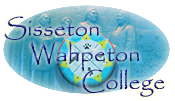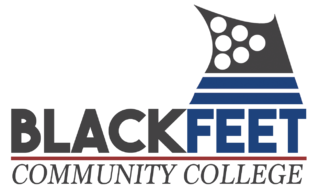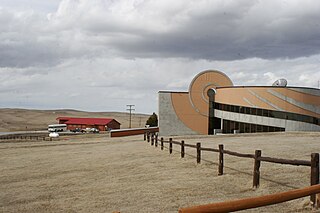
The L'Anse Indian Reservation is the land base of the federally recognized Keweenaw Bay Indian Community of the historic Lake Superior Band of Chippewa Indians.. The reservation is located primarily in two non-contiguous sections on either side of the Keweenaw Bay in Baraga County in the Upper Peninsula of the U.S. state of Michigan. The Keweenaw Bay Community also manages the separate Ontonagon Indian Reservation.

Iḷisaġvik College is a public tribal land-grant community college in Utqiaġvik, Alaska. Operated by the North Slope Borough, a home rule government of the Iñupiat, it is the only tribally controlled college in Alaska, and it is the northernmost accredited community college in the United States. The college is located within the boundaries of the North Slope. It is an 89,000-square-mile (230,000 km2) region of Arctic tundra. It is connected to the 414-mile (666 km) Dalton Highway only during the winter, by an ice road for local residents. The community can also be reached by plane.

Fort Peck Community College (FPCC) is a public tribal land-grant community college in Poplar, Montana. The college is located on the Fort Peck Assiniboine & Sioux Reservation in the northeast corner of Montana, which encompasses over two million acres. The college also has a satellite campus in Wolf Point.
Turtle Mountain Community College (TMCC) is a private tribal land-grant community college in Belcourt, North Dakota. It is located ten miles from the Canada–US border in Turtle Mountain, the north central portion of North Dakota. In 2012, TMCC's enrollment was 630 full- and part-time certificate and degree-seeking students.
United Tribes Technical College (UTCC) is a private tribal land-grant community college in Bismarck, North Dakota. In 2012, UTTC had an enrollment 885 students, 635 full-time undergraduates, and 250 part-time undergraduates.

Salish Kootenai College (SKC) is a private tribal land-grant community college in Pablo, Montana. It serves the Bitterroot Salish, Kootenai, and Pend d'Oreilles tribes. SKC's main campus is on the Flathead Reservation. There are three satellite locations in eastern Washington state, in Colville, Spokane, and Wellpinit. Approximately 1,207 students attend SKC. Although enrollment is not limited to Native American students, SKC's primary function is to serve the needs of Native American people.

Bay Mills Community College (BMCC) is a public tribal land-grant community college in Brimley, Michigan. It is chartered by the federally recognized Bay Mills Indian Community of Michigan with a total enrollment of approximately 500 on-campus and online students. The students come primarily from Michigan's eastern Upper Peninsula and are 60% Native American. BMCC is a member of the American Indian Higher Education Consortium (AIHEC), a community of tribally and federally chartered institutions working to strengthen tribal nations, and a land-grant college.

Sisseton Wahpeton College (SWC) is a Public tribal land-grant community college of the Sisseton Wahpeton Oyate on the Lake Traverse Reservation in South Dakota. It was established in 1979 and serves the Dakota people. SWC has an average enrollment of about 250 students, of whom more than 80% are tribal members. It has both vocational and academic programs, and arrangements with four-year colleges so that students can transfer for continued studies.

Little Priest Tribal College is a public tribal land-grant community college in Winnebago, Nebraska. It is a member of the American Indian Higher Education Consortium and primarily supported by the Winnebago Tribe of Nebraska. It has an enrollment of 135 students, of which 90 percent are American Indian.
Nebraska Indian Community College (NICC) is a public tribal land-grant community college with three locations in Nebraska: Macy on the Omaha Tribe reservation, Santee on the Santee Sioux reservation, and the urban South Sioux City.

Southwestern Indian Polytechnic Institute (SIPI) is a public tribal land-grant community college in unincorporated Bernalillo County, New Mexico, with an Albuquerque postal address. It is federally operated by the Bureau of Indian Affairs and funded through the Bureau of Indian Education, both agencies within the United States Department of the Interior. More than 120 different Indian Tribes are represented in SIPI's student body.

Chief Dull Knife College is a public tribal land-grant community college on the Northern Cheyenne Indian Reservation in Lame Deer, Montana. It is an open-admission college with about 141 students. On average, more than half of its graduates move on to four-year colleges.
Comanche Nation College was a two-year, open admissions, American Indian tribal college. It was located in Lawton, Oklahoma, the capital of the Comanche Nation. The school was chartered in 2002 by the Comanche Nation Business Committee. Comanche Nation College operated until July 31, 2017.
Lac Courte Oreilles Ojibwe College (LCOOC) is a public tribal land-grant community college in Hayward, Wisconsin. It is one of two tribal colleges in the state of Wisconsin. The enrollment averages 550 students. The LCOOC has a main campus in Hayward. More than one-third of students are enrolled at the four outreach sites at Odanah, Bayfield, Hertel, and Lac du Flambeau.

Blackfeet Community College is a private tribal land-grant community college on the Blackfeet reservation in Browning, Montana. The Blackfeet reservation occupies an area of 1,525,712 acres adjacent to Glacier National Park, Lewis and Clark National Forest, and the province of Alberta, Canada. In 1994, the college was designated a land-grant college alongside 31 other tribal colleges.

Tohono Oʼodham Community College (TOCC) is a public tribal land-grant community college in Sells, Arizona. TOCC's student body is 88 percent American Indian/Alaskan Native. Tohono Oʼodham Community College serves approximately 216 students. The college's faculty and staff is 57 percent American Indian, half of whom are Oʼodham.
Red Lake Nation College is a public tribal land-grant community college on the Red Lake Indian Reservation in Red Lake, Minnesota. It is fully accredited by the Higher Learning Commission and enrolls about 150 students. The college is supported by elders and community members who speak the Anishinaabe language and who understand the history of the Red Lake Nation.

Oglala Lakota College (OLC) is a public tribal land-grant community college in Kyle, South Dakota. It enrolls 1,456 students enrolled part- and full-time. OLC serves the Pine Ridge Indian Reservation, which has a population of about 26,000 and covers 3,468 square miles in southwestern South Dakota.
Wind River Tribal College, or WRTC, is a tribally chartered college located in Fort Washakie, Wyoming. The campus is on the Wind River Indian Reservation in central Wyoming. WRTC serves residents of the Wind River Indian Reservation and surrounding communities. WRTC's enrollment consists of mostly Northern Arapaho and Eastern Shoshone students.
Debra J. Parrish is an American academic administrator. She was a president of Keweenaw Bay Ojibwa Community College for almost 30 years.












